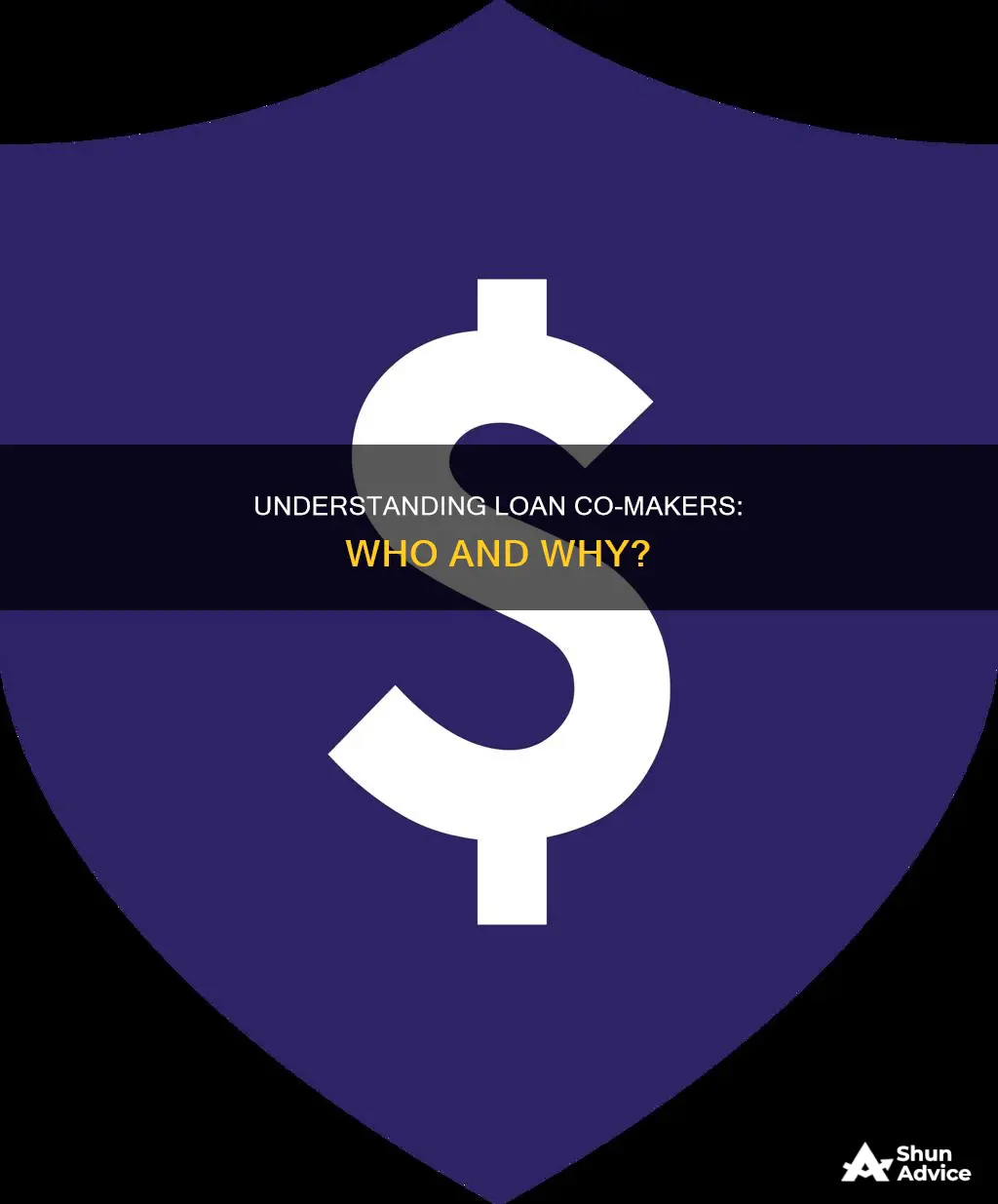
A co-maker, also known as a co-borrower, is an individual who legally agrees to share equal financial responsibility with the primary borrower in repaying a loan. They are often a loved one or friend of the primary borrower, and they help improve the borrower's chances of qualifying for a loan. The co-maker is more than a secondary signer on the loan; they are liable for the debt if the primary borrower defaults and must make payments if the borrower misses them. The co-maker's credit score is impacted by the loan, and they may face legal action if the borrower defaults.
What is a co-maker on a loan?
| Characteristics | Values |
|---|---|
| Definition | A co-maker is a person who legally agrees to share equal financial responsibility with the primary borrower in repaying a loan. |
| Responsibility | The co-maker acts as a secondary signer on the loan and is responsible for making the payments if the primary borrower misses them. |
| Benefits | The co-maker helps the primary borrower secure a loan, especially when they struggle to qualify independently. |
| Risk | The co-maker's credit score may be impacted by the loan. Regular monitoring of the loan's progress and payment history is necessary to prevent any negative impacts. |
| Legal implications | The co-maker assumes legal responsibility for the loan. In case of missed payments or loan defaults, the co-maker may face legal action and become liable for the entire outstanding balance. |
What You'll Learn

Co-maker vs co-borrower
When multiple people apply for a loan, adding a co-signer or a co-borrower can improve the chances of getting approved. However, co-makers and co-borrowers play distinct roles and bear different responsibilities in the loan process and repayment.
A co-maker, or co-signer, is someone who guarantees a loan for someone else. The co-signer agrees to take equal responsibility for repaying a loan but typically does not have access to the funds. The primary borrower is the sole owner of the funds, and the co-signer does not have an ownership interest in whatever is purchased with the loan proceeds. A co-signer is usually a guarantor for the primary borrower and is legally responsible for repayment if the borrower defaults. A co-signer often has a close relationship with the primary borrower, such as a parent, family member, or spouse. They may have better credit or a higher income, which increases the chances of loan approval and helps secure a lower interest rate.
On the other hand, a co-borrower, also known as a joint applicant, is one of several primary borrowers. Each co-borrower has equal access to the loan funds and shares responsibility for repaying the loan. Co-borrowers may have an ownership interest in the thing they are borrowing for, such as joint homeowners applying for a home loan together. Co-borrowing is typically preferable when both borrowers will benefit from the loan, such as in a business partnership. Co-borrowers combine their resources to qualify for a loan, and lenders view them as less risky, potentially leading to larger loan amounts and better rates.
In summary, the key difference between a co-maker (co-signer) and a co-borrower is their level of involvement and ownership in the loan. Co-makers act as guarantors and are responsible for repayment if the primary borrower defaults, while co-borrowers are involved in the entire loan process and share ownership of the funds or assets. Both roles carry financial risks, and it is important to understand the implications before agreeing to be a co-maker or co-borrower on a loan.
Understanding Factors That Increase Your Loan Balance
You may want to see also

Co-maker vs cosigner
A co-maker, also known as a co-borrower, is a second individual on a loan application who shares responsibility and ownership of the debt. They can access the loan funds and have a say in how the funds or assets are used. Both parties are held legally responsible for repaying the loan.
A cosigner, on the other hand, does not have access to the funds or ownership of the loan's funds or assets. They are typically a guarantor for the primary borrower and are only responsible for payments if the primary borrower defaults. Cosigners are usually close to the primary borrower, such as a parent, family member, or spouse.
Adding a co-borrower or cosigner can improve the chances of loan approval and help secure better terms and a lower interest rate. However, it is important to understand the differences between the two roles to avoid future misunderstandings. The main distinction lies in the degree of investment and ownership in the loan. A co-borrower has more ownership than a cosigner because they have equal ownership and responsibility for the loan from the beginning.
Co-borrowing is often preferred when both borrowers will benefit from the loan, such as in a joint business venture or when purchasing a shared asset like a house. In contrast, cosigning is usually preferred when only one borrower will directly benefit from the loan, such as in the case of a parent cosigning on a student loan for their child.
Both roles come with financial risks, and it is important to be aware of the potential impact on credit scores. If the borrower pays late or defaults on the loan, both the co-borrower and cosigner's credit scores could be affected.
How 401(k) Loans Affect Your W-2 and Taxes
You may want to see also

Benefits of being a co-maker
A co-maker, also known as a co-signer, is an individual who agrees to take on the responsibility of paying back a loan if the primary borrower defaults. This arrangement is often used when the primary borrower has a limited credit history, low credit score, or insufficient income to qualify for the loan independently.
Enhanced Loan Approval Chances
A co-maker can increase the chances of a borrower getting their loan approved by lending their creditworthiness and financial stability to the borrower. This is especially beneficial for borrowers who may not meet all the eligibility criteria on their own, such as young adults, immigrants, or individuals with limited credit history.
Shared Financial Responsibility
Co-makers share the financial responsibility of the loan with the primary borrower. This means that if the primary borrower is unable to make payments, the co-maker can step in and make the payments to avoid credit damage for both parties.
Building Credit
If the loan is repaid on time, the co-maker can build their credit history and improve their credit score. This can be beneficial for the co-maker when applying for future loans or other financial endeavours.
Access to Better Loan Terms
Having a co-maker can result in better loan terms for the borrower, such as lower interest rates or higher loan amounts. These improved terms can benefit both the borrower and the co-maker, as the financial burden is shared and more manageable.
Release from Obligation
In some cases, a co-maker may be released from their obligation before the loan is fully repaid. This typically depends on certain conditions being met by the primary borrower, such as a history of on-time payments or an improved credit score.
It is important to note that while there are benefits to being a co-maker, there are also significant risks involved. Co-makers should carefully consider their decision and ensure they are comfortable with the potential financial and legal liabilities before agreeing to co-sign a loan.
Understanding Jumbo Loans in Texas: What You Need to Know
You may want to see also

Risks of being a co-maker
Being a co-maker on a loan means agreeing to take on the responsibility of paying back a loan if the primary borrower fails to make payments. While this can enhance the chances of loan approval, it also carries significant financial and legal risks. Here are some risks associated with being a co-maker:
Financial Risk
The co-maker is legally obligated to repay the loan if the primary borrower defaults. This can put a strain on the co-maker's finances, especially if they are not prepared to take on the additional burden. It is important to assess the borrower's ability to repay the loan and understand that you may need to make the payments if they cannot. This responsibility can impact the co-maker's credit score and future loan eligibility. Any missed payments or defaults will reflect on the co-maker's credit report, potentially affecting their ability to qualify for future loans or other financial opportunities.
Legal Consequences
If the co-maker fails to make payments when the primary borrower defaults, they may face legal consequences. The lender can demand payment from the co-maker, enforce the contract, and even sue them. The co-maker may also be held liable for any bounced checks issued as security for loan payments. These legal actions can result in judgments against the co-maker, potentially leading to the execution of their bank accounts, funds, or property.
Relationship Strain
Agreeing to be a co-maker can also impact personal relationships. If the primary borrower is a friend or family member, there is a risk of straining or damaging the relationship if they fail to make payments and the co-maker is held responsible. It is important to consider the potential financial and emotional consequences on the relationship before agreeing to be a co-maker.
Difficulty Withdrawing
Generally, a co-maker cannot unilaterally withdraw from the loan agreement once the loan has been disbursed. They are bound by the terms of the contract and may find it challenging to release themselves from the obligation. While some loan agreements may include conditions for releasing a co-maker, such as refinancing or meeting certain payment criteria, it is not always a straightforward process.
In conclusion, while being a co-maker can help someone secure a loan, it is not a decision to be taken lightly. It is crucial to fully understand the responsibilities, risks, and potential consequences before agreeing to become a co-maker.
Lending Club Hard Pull: What You Need to Know
You may want to see also

Legal responsibilities of a co-maker
A co-maker on a loan is a guarantor of the borrower's debt, and they take on significant legal and financial responsibilities. The borrower is primarily responsible for repaying the loan, but if they default, the co-maker is legally accountable. The co-maker agrees to cover the debt if the borrower cannot, making them liable for the outstanding balance. This arrangement is common in personal loans or small lending agreements, especially when the borrower has limited collateral or a lower credit profile.
When an individual becomes a co-maker, they are legally bound to the contract, jointly and severally, with the principal borrower. This means that if the borrower defaults, the co-maker must make the payments to avoid credit damage and legal consequences. The co-maker is equally responsible for the loan and any missed payments or defaults can negatively impact their credit score and their ability to obtain future loans.
Lenders have the right to seek full repayment from the co-maker, including the principal amount, accrued interest, penalties, and fees stipulated in the loan agreement. In some cases, co-makers may be asked to sign post-dated checks as security for loan payments, and they can face legal repercussions if these checks bounce due to insufficient funds.
Before agreeing to become a co-maker, it is crucial to conduct due diligence by assessing the borrower's financial situation and understanding the loan terms and associated risks. Consulting with a financial advisor or attorney is recommended to fully comprehend the implications of this commitment. The co-maker should also establish a clear agreement and communication strategy with the primary borrower to manage the loan effectively.
While the co-maker plays a crucial role in enhancing loan approval chances and providing shared financial responsibility, it is a significant responsibility that can lead to financial liabilities if the borrower defaults. Therefore, careful consideration and legal awareness are essential before entering into this obligation.
Understanding the Basics of Swingline Loans
You may want to see also
Frequently asked questions
A co-maker is a person who legally agrees to share equal financial responsibility with the primary borrower in repaying a loan. They are also known as a co-borrower or secondary signer.
A co-borrower shares ownership of the asset and equal loan responsibility. A co-signer does not have rights to the property or asset tied to the loan, but they help the borrower qualify for the loan and agree to make loan payments if the borrower cannot.
Being a co-maker can limit future borrowing capacity due to its impact on debt-to-income ratios. The co-maker becomes liable for the debt if the primary borrower defaults or misses payments, and they may face legal action or negative impacts on their credit score.







